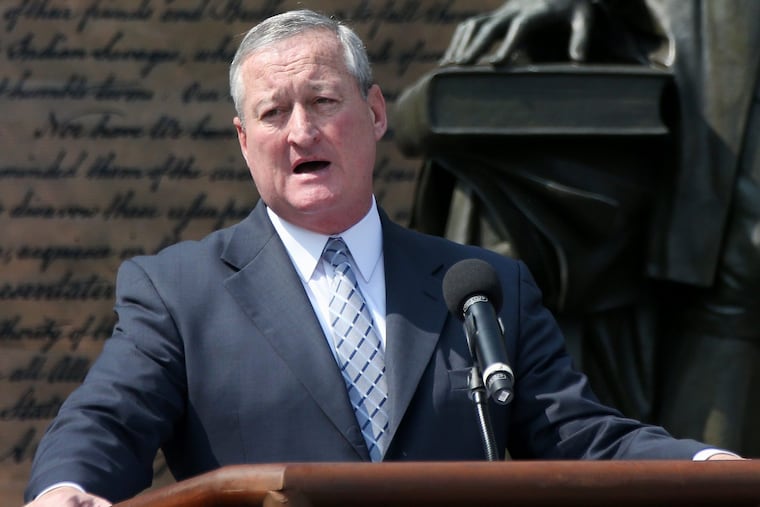Why Glaxo isn’t meeting with Mayor Kenney while he’s in London
GSK declined the meeting with Mayor Kenney after a City Council bill was submitted that would force drugmakers to register their sales reps. Is there a connection?

It's Philadelphia week in the U.K., with the Eagles playing the Jaguars in London on Sunday. And Mayor Kenney, leading a tour of state and local officials and business groups through the land of Shakespeare and Monty Python, wanted to call on GlaxoSmithKline, the London-based drug giant that used to occupy nearly a million square feet of Center City office space before it consolidated operations in the Navy Yard.
But a meeting wasn't to be. The Kenney team and Pennsylvania state officials were unable to get time with people close to Glaxo chief executive Emma Walmsley, who stops in New York and in Collegeville a few times a year. Glaxo employs 3,500 at its growing labs in western Montgomery County.
"While it is unfortunate our schedules could not align on this occasion, we are always open to meeting with the mayor and his staff to discuss mutual areas of interest where we can work together," Glaxo spokesperson Evan Berland told me.
A businessperson associated with Kenney's trip tells me that Glaxo declined the meeting after receiving advice from industry leaders that it's a good way to send a message to Philadelphia's activist city government: Kenney is hitting London and missing the biggest British company with a significant Philly presence.
The apparent snub comes two weeks after City Council members William K. Greenlee and Cindy Bass introduced a measure to require drug salespeople to register with the city, wear distinctive badges, and submit drug sales and marketing propaganda for city review, on pain of fines of up to $500 a day.
Is that bill Glaxo's real concern? "We were not given any indication that this had anything to do with reasons beyond scheduling," Lauren Cox, a city commerce department spokesperson, told me.
One Glaxo official said privately that, after all, it's fall break week for English schools, and some high-powered parents might be off on holiday. But that's not stopping Kenney and company from visiting Philly-based Curalate's London office and other small U.K. businesses (Cox declined to supply a full list).
Bass cosponsored the drug sales registration bill at the Kenney administration's request, said her spokesperson, Layla Jones. "I don't understand why anyone would oppose it," said Greenlee, noting that city hospitals already ban salespeople from giving gifts to medical staff, another provision in his bill. He added that he hadn't talked to drug industry officials about the law.
Why is Philly trying to impose its own drug policy? "The opioid crisis began with the aggressive marketing of prescription painkillers by pharmaceutical sales representatives, which led to a huge increase in opioid prescribing," said city health department spokesperson Dan Garrow. "Prescribing of other drugs that can be abused — such as amphetamine, also known as Adderall — has also risen significantly."
"The Philadelphia bill attempts to limit the damage from this aggressive marketing."
According to Bill 180888, local "pharmaceutical agent" registration and review are needed because "over 1,200 people are believed to have died from drug overdoses in 2017, over 80 percent of which involved prescription opioid painkillers, heroin, or fentanyl."
The proposal goes on to add that "pharmaceutical companies have made misleading claims about medications other than opioids," including Zyprexa (Eli Lilly's antipsychotic drug), Effexor (a Pfizer antidepressant), and Pamine (an Endo ulcer drug).
To "restore trust among patients," the bill would require drugmakers to register their sales reps with the health department, pass out health department warnings, wear health department badges and ID numbers, submit their drug marketing materials to the health department so it can suggest "further education and training" (for example, in pain management) for both salespeople and doctors, and pay a yearly fee of up to $250. Violators could be fined $500 a day.
Greenlee says Chicago and Washington also register drug reps. He said the effort hasn't gone on long enough to show whether local regulation reduces drug abuse. But "to me this is a no-brainer," he said.
Glaxo, which doesn't currently sell opioids, is reviewing the proposal, Berland said.
Pharma CEOs have privately called to express their concerns, says Christopher Molineaux, head of Life Sciences Pennsylvania, which represents drugmakers, biotech firms, and other industry interests. "The biopharma industry is extremely concerned about the opioid crisis and is taking significant steps to address it. However, public policy that puts city government between physicians and the manufacturers of all medicines – not just opioid-based drugs – is simply bad policy."
"A lot of these activities are already conducted by the FDA," Molineaux added. He said it's doctors, not drugmakers, who write prescriptions. Sales reps are "highly trained, their material is carefully scrutinized by the FDA before it's disseminated."
I asked whether he could sympathize with Philadelphia's elected leaders who are skeptical that the FDA was doing a good job back in the 2000s and early 2010s, when doctors, encouraged by drugmakers, were writing piles of opioid painkiller prescriptions for youth sports injuries, wisdom-teeth extractions, and general backaches, and closetfuls of unused pills were given or sold to people addicted to the drugs.
He questioned whether Philadelphia could afford to alienate one of the region's biggest industries. Philadelphia tourism relies on dozens of yearly medical and drug conventions, and a restrictive city policy sends them "an unusual message," Molineaux concluded: " 'We want to have your business. We just want to make it difficult to sell your product.' "
Drug duality is an old story in Philadelphia, center of hopeful medicine and persistent poverty, lucrative drug development and deadly abuse.